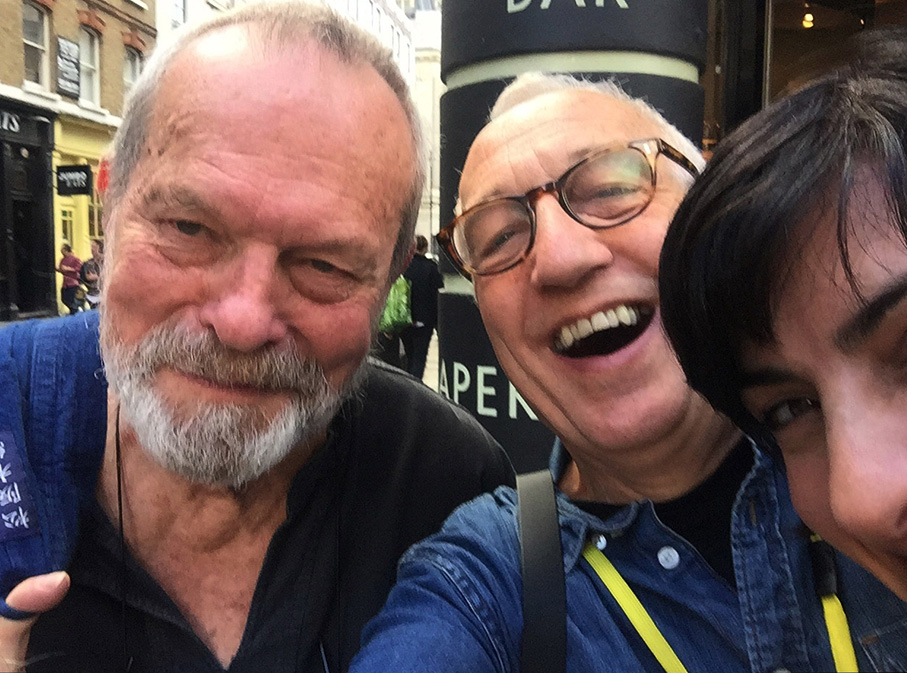|
Note: There are a few mild spoilers in this brief chat so best to see the film before you read on.
Film editing, in the days of actual film editing, was a physical, hands on profession. You lugged heavy cans around, you laced celluloid in to the Moviola or Steenbeck and you physically cut your selects from the rushes to create what was known as ‘the cutting copy’. It was this that was moulded into what would become a fully-fledged motion picture experience. Editors all have their stories, their common experiences to be shared with knowing looks with others who ply this fascinating trade. After all, the editor is central to the film making process, the final ‘writer’ one might say together with the director huddled over a small screen, the controlled chaos of production long behind them. In the cutting room ideas crystalise, are born and die. The best are woven into the cut and it is in the cutting room that the film is ‘locked’ and sent off to get its soundtrack fashioned and its colour timing corrected. These days, the word ‘grading’ has become ‘colour correction’ umbrella term. It was in this analogue world, not today’s digital one, that 12 Monkeys was wrought although I must mention that digital effects played an important part in the film. You get tantalising glimpses of the editorial process in the feature length extra ‘The Hamster Factor and Other Tales of Twelve Monkeys’.

Mick Audsley’s memories of the experience are hugely positive. “I can’t tell you how much I enjoyed working on it,” he says. The selfie above, taken very recently with director Terry Gilliam, confirms that friendships were forged and endure because of the heightened emotional experience of filmmaking. There’s no business quite like show business to form close bonds. While in the midst of finalising the film, after the third preview screening, Mick’s diary entry of September 12th, 1995 notes some of the more colourful responses to the work in progress; the film “will be better when edited.” Ouch! And the unequivocal “Shoot the fucking writers!” Terry and Mick subsequently received a letter from the writers (David and Janet Peoples). David had been a film editor so knew exactly what he had unleashed on Mick and company and had written the following to producer Chuck Roven;
"Give our love to Terry and Mick and remind them that David got out of editing in order to get upstream of the flow of shit, and even to initiate it, rather than to toil and suffer downstream in the muddy water. Love Peoples and Peoples.”
Mick speaks with great fondness for both David and Janet. While the writers were very specific in terms of structure, there was some leeway in the edit as to how the airport flashback/forward would pan out, what details to slowly reveal. Mick came to realise that an audience is very quick to pick up information citing the pony-tail of David Morse as an example. He used the term ‘eye drops’ to describe the slow drip of detail dropping into the eyes of the audience so connections can be made. He also clarified the idea of ambiguity in the film. There must be a choice of outcomes but they must be extremely clear. Ambiguity did not mean woolly thinking but a specific choice the audience is asked to make between two distinct, possible realities.
Mick also cited the metaphor of emptying bathwater, the idea that the film started wide on a full bath, and as we move in the spirals of water get smaller, faster and tighter. The ideas were cut to coalesce in the same manner throughout the film. The final visual effects worked extraordinarily well (the flamingos, the giraffes and the lion) but we know the bear that so scared Bruce Willis on his snowy jaunt topside was real, because it lived in a cage just outside Mick’s cutting room in Philadelphia. I was shocked to find out that the lion was computer generated. It just looked so good. I asked Mick whether it was the photograph of Willis in the trenches where the movie tipped its hand towards one reading of the events over the other. Mick reminded me that the bullet in the leg was a pretty substantial clue. It was when Madeleine Stowe came on board and started helping Willis that represented the tightest spirals of that bathwater mentioned earlier, actions that subsequently unravelled as Willis tries to stop the real perpetrator. It seemed that both Mick and Terry were happy with the running time of 123 minutes but as Mick pointed out, technically the studio could refuse final cut and take creative control as the film was over two hours. Subsequently Mick cut it down to 119 minutes thus preserving Terry’s control over the edit.
Mick mentioned that he was invited to give a talk in Slovakia on 12 Monkeys and he vowed to watch parts of the screening to refresh his memory. He ended up watching the whole movie and was riveted. I guess if you are far enough away from the actual film even if you edited it yourself over 20 years ago, you can have a valid emotional response to your own work.
My thanks to Mick Audsley for his time and would urge you to register at Sprocket Rocket, (https://sprocketrocketsoho.com) a filmmaker’s networking site that puts on hugely entertaining and educational events with key industry people. Sprocket Rocket Soho was set up by Mick and his wife Joke van Wijk and the events I’ve attended have been superb. It makes me miss not living in London. Also Mick’s diaries at the time of 12 Monkeys’ production are featured in the BFI book, Inside Stories; Diaries of British Filmmakers at Work, well worth hunting out.
|